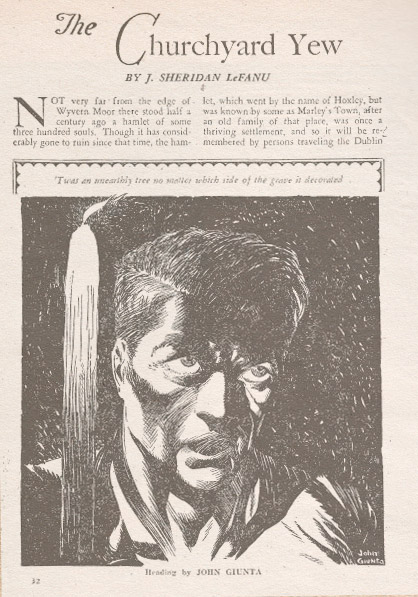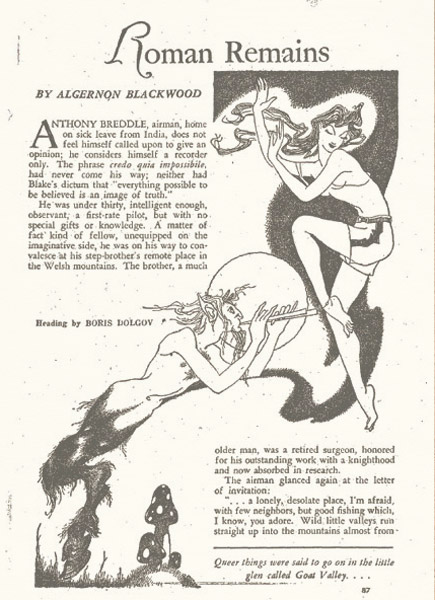|
|
Post by dem on Oct 10, 2009 6:11:42 GMT
August Derleth (ed.) - Night's Yawning Peal (Consul, 1965: originally published in the USA by Pellegrini & Cudahy, 1952) Foreword - August Derleth
Stephen Grendon (August Derleth) - Mr. George
C. M. Eddy - The Loved Dead
Lord Dunsany - The Sign
Carl Jacobi - The La Prello Paper
H. Russell Wakefield - The Gorge Of The Churels
Manly Wade Wellman - Dhoh
J. Sheridan LeFanu (August Derleth?) - The Churchyard Yew
John Benyon Harris - Technical Slip
Robert Bloch - The Man Who Collected Poe
Michael West - Hector
Algernon Blackwood - Roman Remains
Malcolm Ferguson - A Damsel With A Dulcimer
Richard Curle - The Suppressed Edition
August Derleth - The Lonesome Place
Blurb: Horror and terror fill these pages. Unusual ghosts and things that defy description make their brief entrance upon their little stages in this weird company which offers new fillips to jaded appetites, put together by August Derleth, a foremost specialist and writer of horrifying tales for more than a quarter of a century.The Pellegrini & Cudahy edition also includes H P Lovecraft's short novel, The Case of Charles Dexter Ward which certainly makes for a stronger collection. Familiar as it is, it's always pleasant to chance upon C. M. Eddy's first-person account of a necrophiliac's progress, and Derleth's Mr. George is one of the more memorable stories from his vast output. Whatever possessed him to try and pass off (his own?) The Churchyard Yew as the work of J. S. Le Fanu is something only he can explain. Wellman's story sees a Native American demon set loose on know-it-all anthropologist James Randolph. Bloch's justly praised The Man Who Collected Poe is one of those everybody-should-have-a-copy stories. The creepy cover art is, of course, uncredited.
|
|
|
|
Post by dem on Mar 17, 2012 13:32:54 GMT
Never mind the pseudonym, these four all by Derleth.  John Giunta John Giunta: ( Weird Tales, July 1947). " The Churchyard Yew, never published in any previous collection of the author's work, is at least a century old" claims Mr. Derleth in his introduction, and you can only admire his cheek. First time around, it made little or no impression, but it's a tidy enough pastiche with a tasty E.C. comic ending. Wyvern. Charlie Sprowl, the knob-headed, ugly but genial sexton becomes embroiled in a dispute with the new parish priest, Rev. Timothy Harker over a tree in the churchyard. Rev. Harker wants it repositioned where he can see it from the rectory, Sprowl, who planted it, refuses in no uncertain terms. The bitter war of words escalates until the night Sprowl staggers out of the pub, hits his head and dies in a ditch. The new sexton, Mr. Ames is more amenable to Rev. Harker's wishes and moves the yew as instructed, but Sprowl isn't one to take death lying down. The tree is uprooted and replanted several times before all is resolved in an inevitable bloody climax. Stephen Grendon - Mr. George: Manhattan. Five year old Pricilla takes the street-car across town to lay flowers on the grave of her kindly 'uncle', Mr. George, and ask him to come home. Her life has been so miserable since he left. Uncle Laban and Aunts Laura and Adelaide of the deformed head (there sure are plenty of them going around in Derleth's work), clearly find her presence an encumbrance, though she has no inkling why. And what are they always whispering about? By the terms of her dead mother's will, these vultures stand to inherit all should anything happen to Pricilla, and they're determined that it shall. 'Accidents' are arranged, only for them to spectacularly backfire on the perpetrator because Mr. George - who may or may not be Pricilla's father - is as devoted to protecting the little orphan as he is avenging his murder. Heads will roll, loll or undergo radical restructure! 'Michael West' - Hector: When George Hesperson - what's left of him - recovers conciousness after a wall fell on him, he finds himself sharing his house with Mr. & Mrs. Gruber. It's very kind of them to look after him, he just wishes they'd acknowledge him sometimes. But it's not so bad. He still has the ghost of his faithful dog, Hector, to keep him company. Or, at least, that's the way he sees it. August Derleth - The Lonesome Place: As kids, the narrator and best pal Jimmy Newell would scare each other silly with tales of the bogeyman haunting the dark stretch of land between the sheds, lumber piles and mighty oaks at the grain elevator. Now grown adults, the terrible demon of their imaginations has manifested into a child-mangling reality! |
|
|
|
Post by dem on Mar 18, 2012 18:57:38 GMT
Lord Dunsany - The Sign: Another of Jorkens' tall tales from the billiard room, this one concerning the transmigration of the soul. Horcher, a walking superiority complex and habitual snail-stomper, promised Jorkens that, when he died, he'd leave a sign to inform him of his elevation to God-like status. In the event, it doesn't quite work out for him. Manly Wade Wellman - Dhoh: Rueben Pipe Feather, tour guide and sometime Hollywood film extra, despises his people as a bunch of superstitious fools, their belief in Dhoh, the bear-demon, a particular source of mirth. But when he spots the tell-tale half-man, half-bear prints while he's showing an American reporter around the Katonika reservation, he's off as fast as his legs can carry him. Luckily for Mr. Randolph, a kindly old man in a decrepit blanket appears from nowhere and volunteers his services as a tracker. A good thing Randolph though to bring a camera!  Boris Dolgov Boris Dolgov: To escape the London Blitz, pilot Anthony Breddle continues his convalescence at the home of his surgeon brother on the River Wye. Fellow guests include Dr. Leidenheim, a keen student of Roman archaeology, and an inscrutable nurse, Nora Ashwell, to whom Breddle takes an instant dislike. Breddle's brother half-jokingly informs him of a little glen, Goat Valley, shunned by the locals, which boasts a ruined temple to Silvanus. Queer things are said about Goat Valley, and it's now being blamed for the recent spate of monster births in the district. None of which bothers Nora in the slightest as she has already fallen under the deity's spell ... Blackwood evidently didn't think much of this effort (or perhaps he was using reverse psychology) as he sent Derleth his only copy and advised him to tear it up should he agreed that it was unusable. When Derleth duly found Roman Remains a home at Weird Tales, Blackwood wrote again, thanking him for placing "my somewhat questionable story" which he now hoped to develop "into something really worthwhile" at a later date. (source: Mike Ashley, The Blackwood-Derleth Correspondence in Simon Gosden's Out Of The Woodwork #1, 1986)
|
|
|
|
Post by Michael Connolly on Mar 15, 2021 21:07:13 GMT
August Derleth (ed.) - Night's Yawning Peal (Consul, 1965: originally published in the USA by Pellegrini & Cudahy, 1952) Foreword - August Derleth
Stephen Grendon (August Derleth) - Mr. George
C. M. Eddy - The Loved Dead
Lord Dunsany - The Sign
Carl Jacobi - The La Prello Paper
H. Russell Wakefield - The Gorge Of The Churels
Manly Wade Wellman - Dhoh
J. Sheridan LeFanu (August Derleth?) - The Churchyard Yew
John Benyon Harris - Technical Slip
Robert Bloch - The Man Who Collected Poe
Michael West - Hector
Algernon Blackwood - Roman Remains
Malcolm Ferguson - A Damsel With A Dulcimer
Richard Curle - The Suppressed Edition
August Derleth - The Lonesome Place
Blurb: Horror and terror fill these pages. Unusual ghosts and things that defy description make their brief entrance upon their little stages in this weird company which offers new fillips to jaded appetites, put together by August Derleth, a foremost specialist and writer of horrifying tales for more than a quarter of a century.The Pellegrini & Cudahy edition also includes H P Lovecraft's short novel, The Case of Charles Dexter Ward which certainly makes for a stronger collection. Familiar as it is, it's always pleasant to chance upon C. M. Eddy's first-person account of a necrophiliac's progress, and Derleth's Mr. George is one of the more memorable stories from his vast output. Whatever possessed him to try and pass off (his own?) The Churchyard Yew as the work of J. S. Le Fanu is something only he can explain. Wellman's story sees a Native American demon set loose on know-it-all anthropologist James Randolph. Bloch's justly praised The Man Who Collected Poe is one of those everybody-should-have-a-copy stories. The creepy cover art is, of course, uncredited. The cover art, the cat and all, seems to have been "inspired" by imagery from Roger Corman's film of "The Tomb of Ligeia" from 1964. |
|
|
|
Post by andydecker on Mar 16, 2021 9:09:03 GMT
The cover art, the cat and all, seems to have been "inspired" by imagery from Roger Corman's film of "The Tomb of Ligeia" from 1964. Yes, it's been ages I have seen it - Vincent Price with sunglasses after dark - but it could have been a movie poster. |
|
peedeel
Crab On The Rampage
 
Posts: 61
|
Post by peedeel on Mar 17, 2021 8:29:37 GMT
The cover art, the cat and all, seems to have been "inspired" by imagery from Roger Corman's film of "The Tomb of Ligeia" from 1964. Yes, it's been ages I have seen it - Vincent Price with sunglasses after dark - but it could have been a movie poster. Ah, those incredible sunglasses! 1821 Foster Grants with sides! The Tomb of Ligeia is one of my favorite Roger Corman adaptations of E.G. Poe. Vincent Price’s sudden appearance beside Ligeia’s tomb, causing Lady Rowena to scream and faint away. Pure Gothic melodrama – but so effective. I love, too, the hairbrush scene. When fair Rowena wakes, hears someone brushing their hair, but finds black hair on the brush and no one else around. And not a single computer generated image in sight!  |
|
|
|
Post by andydecker on Mar 18, 2021 8:37:56 GMT
Ah, those incredible sunglasses! 1821 Foster Grants with sides! Vincent knew how to look good. Even when he was deranged. I really have to think about getting some candelabras. |
|